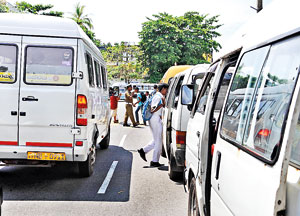News
Calls for crackdown: School van driver caught drunk driving at 7 a.m.

The NCPA says it is the parents responsibility to check their children's school vans
Last week the Piliyandala police charged a 40-year-old school van driver with drunk driving, after he was nabbed in front of a school by the traffic police and produced in courts. His licence was suspended for a year, and he was fined Rs 5,000.
While the law allowed him to get away with a pat on his shoulder, parents argue that he had risked the lives of 15 young children by consuming alcohol. The man was detected around 7 am, an indication he is an addict.
This incident has brought home the need to regularise the thousands of school vans in the country that transport schoolchildren.
The National Child Protection Authority (NCPA) places the onus on parents to check the bona fides of van owners. NCPA Chairman, Natasha Balendera said it is the parents’ responsibility to be mindful of the persons conducting the service. “They have to check the condition of the van, whether it is overcrowded, well ventilated and if the driver is reliable. They should also question their child every day on arrival,” she said.
However, parents say that, despite all the checks, it is not possible to determine whether the drivers have a drinking problem. Even though they could assure themselves initially, there could be a change of driver and they cannot keep on checking. “The owner of the vehicle should take the responsibility and employ reliable persons with no alcoholism,” one parent said
As of now, there is no regulation governing school vans and drivers, and owners of school vans who operate under the influence of liquor can go undetected, except in random instances like the one in Piliyandala.
The Western Province Road Passenger Transport Authority (WPRPTA) said that, in October 2013, moves to regulate the school van service and introduce restrictions and checks on conductors and drivers against alcohol consumption, drug use and smoking when transporting schoolchildren has been a failure.
Director, Gunasoma Wanniarachchi said that, under the gazette notification, all school vans, taxis and three-wheelers carrying schoolchildren into the WP were to be regulated. But its implementation has been prevented due to political pressure he said.
Gazette notification 1834/28 of 2013 states that all vans operating passenger service for schools should possess permits from the WPRPTA and that, they should possess all facilities to carry schoolchildren. The regulations included overcrowding, availability of leg space, air conditioning, ventilation and emergency exit doors.
Meanwhile, the WPRPTA too has come up with the suggestion of using small vans and three-wheelers as a para-transportation service. This would mean that these vehicles will only serve as a feeder service of children from their homes to their school buses and from the school buses to their homes. However due to severe opposition from the Three-Wheeler Associations, the idea had to be shelved. “They insisted that they be given free passage on the main roads,” he said.
It is debated that the recommendations if followed will help reduce congestions. There are around 500,000 three wheelers operating in the western province and restriction of three wheelers doing school service during the school peak hours will restrict traffic congestion in the WP. Also the prohibition of the 5000 school vans into WP will also help ease traffic. If the vans are restricted from the main roads the traffic congestion can be eased. “Passenger loads of five vans can be contained in one bus. This will reduce congestion and provide safety to children.” he said.
The National Transport Commission(NTC) which is responsible for the road safety of passengers, said that, although school vans do not come under their purview, they have solutions to the problems faced by the provinces. NTC Chairman M.A.P. Hemachandra said a request has been made to the Attorney General to transfer the authority of managing school buses and taxis to the NTC, so that it could be regulated. “We have plans to regulate school vans, taxis and three-wheelers, if the authority is transferred to us,” he said.
The NCPA has also requested a mandate to register school transport vans from the government. Ms Balendera said that, in 2013, a pilot project was conducted by the NCPA to register school van drivers. “We did this for around one year and had to scrap it because the Transport Ministry said that we are not mandated to register them,” she said.
However, she said she was in consultation with the Transport Ministry and the NTC to grant the NCPA the mandate to register and regulate the service. Also, talks are being held with the RMV to grant licenses to school van drivers, only for a maximum period of two years. “This we way we can monitor them,” she said.

